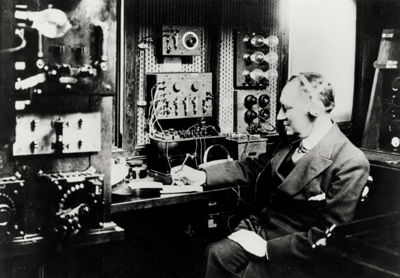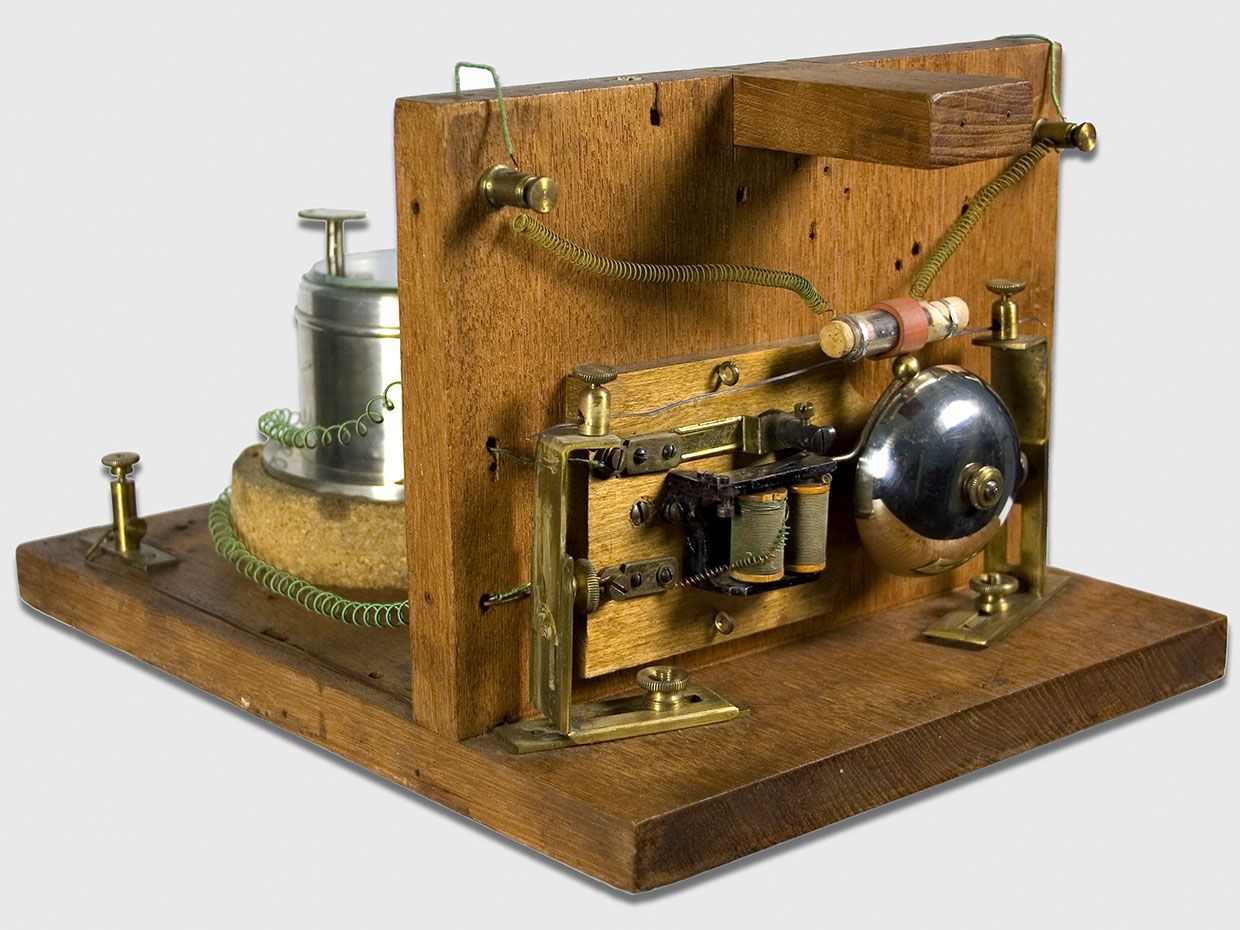Today (July 20, 1937) is the Memorial Day of Nobel Prize-winning Guglielmo Marconi, who invented long-range radio with valves.

"Reading the airwaves news" In the 80s and 90s there could not be people who were not mesmerized by hearing this word on the radio. Marconi is currently known as the father of long-distance radio broadcasting. Guglielmo Marconi was born on April 25, 1874 in Bologna, Italy. Father Kaisab Marconi. Ready Anne Jameson is from Ireland. His father was an Italian grandson. Thus, Marconi had a comfortable life at a young age. His primary education was in Bologna, Florence, and Leghorn. Mikithi was interested in his studies during his youth.

He read science books at the library at home. Even after growing up, he did not study at a university. Teachers came to teach him at home. He became more interested in physics, especially electronics. In 1905 he married Marconi O'Brien. The couple had three daughters and a son. The couple divorced a few years later.

The concept of electromagnetic waves in the Marconi period was published by the scholar James Clark Maxwell. Heinrich Rudolph Hertz confirmed them by further research. The principles of electromagnetic waves were previously derived from the research of James Clark Maxwell and Michael Faraday. Can transmit electromagnetic waves. Hertz further explained that they travel in straight lines across space and can be obtained by means of experimental instruments. The experiments were not followed by Hertz.
Oliver Lodge in the UK was also involved in the study. He also had a patent for it. But he sold the rights to Marconi. In 1894, the Indian physicist Jagadish Chandra Bose demonstrated electromagnetic radio transmission in Kolkata. Jagadish Chandra Bose developed the earlier wireless information detection device during this period. He also helped increase knowledge of millimeter-long electromagnetic waves. But he did not receive a patent for it and did not pursue the study. The news was published in 1896 in the English daily 'Daily Chronicle' from England.

In 1891-93, Nikola Tesla, a scientist, confirmed and patented his invention of radio. It has been alleged that Marconi did the research with Tesla's wire coil. Tesla was sued by Tesla for his research using 17 of my patented tools and was sentenced to be the first inventor of radio. But it was not until years later that Marconi appealed and a favorable verdict was handed down. After Hertz's death in 1894, Augusto Wright, a professor of physics at the University of Bologna, began further research with Hertz's notes. Marconi then joined him in accompanying him. Practical applications of wireless communication and remote control technologies were implemented by later inventors.

Marconi has been doing solo research in his home as well. He expressed the idea that 'electromagnetic waves can flow through any object'. In 1894 he sent gestures by electric waves. He was involved in creating the 'wireless telegraph system' with radio waves. This method has been tried by many for 50 years but no results have been achieved. But Marconi succeeded in communicating it in 1895 with a device called a 'directional antenna' that could send a message about 1.5 km away. The Italian government paid no heed to this rare endeavor.

So, Marconi went to London and explained the news of his study there. William Freese, chief engineer of the English Post Office, was interested and encouraged by his research. In March 1897, after a series of researches, Morse developed an electromagnetic transmitter to transmit the waveform over a distance of 6 km. On May 13, 1897, through the water, 'Are you ready?' Developed a transmitter that transmits the message over a distance of about 14 km. Freel, who was fascinated by his research, lectured at the Toynbee Hall on December 11, 1896, entitled "Telegraph without wire." He then assisted the Royal Society in presenting its explanations. In 1897 the Marconi Company was started in England. In 1897 he made contact with the ship 18 miles from shore. In 1899 he made a wireless connection across the English Channel to England and France, operating at any time, for a radius of 200 miles.

It was only after the Italian government noticed this that it turned its attention to Marconi. As a result, he conducted several experiments on his native soil in July 1897 at La Spezia. There, with the help of the government, Marconi set up a radio station in Steiser. He said the news from there was about 20km away. Reached the warships beyond. In 1898 he set up a radio in his company's name on the ship East Godwin. Some time later another vessel collided with the ship. So the sinking of the ship occurred. Marconi immediately spread the word about the danger of drowning by a radio station. Rescue boats from the lighthouse rescued them. In 1905 a number of merchant ships and warships installed Marconi's wireless communications equipment and connected with shore stations. Marconi's rare devices were later used extensively in the navies of England and Italy.

In 1899 a large boat race was held in New York City, USA. Marconi then fitted his equipment on board the ship and made the results of the match available to reporters immediately. Through this the United States realized the need for radio. Mathematical experts do not accept the spread of radio. Because the world is round, radio broadcasting can go straight up to a hundred miles. They sought to thwart Marconi's efforts by claiming that the curve of the globe would not spread over it. But Marconi continued his work without heeding it all.
In 1900 he created a long-distance radio station. He planted a 200-foot-high pole and attached a barbed wire to it. The hurricane threw the pole down due to natural causes. Marconi lowered his height slightly and planted another pole to connect the Atlantic surface with his radio. On 12-12-1901 he crossed the Atlantic for 2100 miles and sent the message. The news was announced around the world. His pride spread all over the world. In 1907 they were further refined and Atlantic telecommunications became widely available to the public. Marconi did more research and invented and used a device that produces series waves. He proved that it could send messages tens of thousands of miles away.

Marconi's radio studies were recognized, and in 1909 Marconi was awarded the Nobel Prize, along with the German Carl Ferdinand Brown, who had already done extensive research on wireless telegraphy. He lost his right eye in a car accident in 1912. However the research continued. When World War I broke out in 1914, he used radio in Italy's ground and navy. Volunteered as a member of the U.S. War Committee. He supported Mussolini and joined the Italian Fascist Party. In 1919, when the war subsided and peace was restored, he was honored to sign several treaties for his homeland. In 1920, Mussolini conferred on him the title of Marquis.

In 1930 he was elected President of the Italian Royal Academy. Proud to have been awarded the Britz of America medal. England was proud to present Victoria the Great Cross. Marconi died in Rome, Italy, on July 20, 1937, at the age of 63. The radio stations all paid tribute to the two-minute radio silence. Radio has been entertaining the people of the world for over eighty years. It serves not only as an entertainment device but also as a repository of information. Despite the advent of television and the Internet, radio still has a place in many people's lives.

Radio is a good friend to many of you, and it's also a comfort to those who fall asleep listening to it. Many people wake up to the sound of the radio. Twenty-four hours is enough to accelerate that key for any second, and the music crawling in the airwaves will come and hit your ears. Those who think they have to say thank you after listening to a good show on the radio should really thank Marconi. Anything can be achieved when hard work is combined with vision and perseverance. Anyone who follows these attributes will surely be captivated by that sky.
Source: Wikipedia
Information: Dr. P. Ramesh, Assistant Professor of Physics, Nehru Memorial College, Puthanampatti, Trichy.
Get information like this


.png)
.jpg)
No comments:
Post a Comment